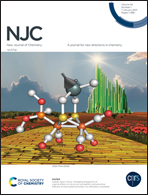Synthesis and properties of a bio-based PVC plasticizer derived from lactic acid
Abstract
A novel green plasticizer, acetylated lactic acid 1,6-hexane diester (ALHD), was successfully synthesized based on L-lactic acid, a renewable organic acid from corn starch. Its chemical structure was characterized using FTIR, 1H NMR and matrix-assisted laser desorption/ionization time of flight mass spectrometry (MALDI-TOF-MS). The plasticizing effects of ALHD as an alternative substitute for commercial plasticizer acetyl tributyl citrate (ATBC) in poly(vinyl chloride) (PVC) were investigated in detail. The results show that the PVC films plasticized using ALHD have better organic solvent resistance and food mimic migration stability than ATBC. After 24 hours of extraction in cyclohexane and petroleum ether, the weight loss of PVC sample S5 plasticized using pure ALHD was reduced by 83.6% and 77.5%, respectively, compared to that of PVC sample S1 plasticized with pure ATBC. Furthermore, after 72 hours of migration in activated carbon, the weight loss of PVC sample S5 decreased by 44.0% compared to that of PVC sample S1, which indicated that ALHD had excellent volatility and migration stability. The elongation at break of the PVC pieces increased from 644.65% to 802.15% as the content of ALHD improved, showing an increase of 24.4%. The mechanical property analysis showed that, with the replacement of ALHD in the place of ATBC, the PVC blends exhibited better flexibility and elasticity.



 Please wait while we load your content...
Please wait while we load your content...